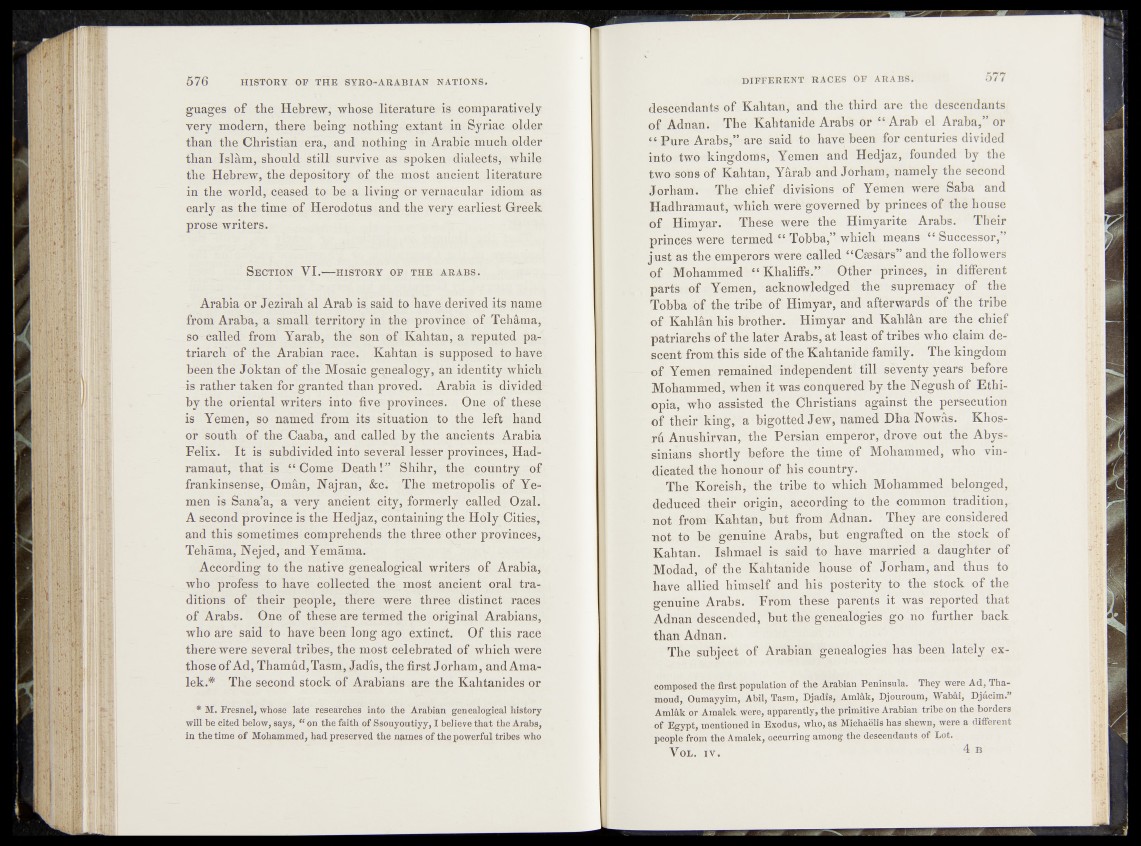
guages of the Hebrew, whose literatuffe is comparatively
very modern* there being nothing extant in Syriaci elder
than the Christian era, and nothing in Arabic much older
than Islam,»should still? survive as spoken dialects, while
the Hebrew, the depository of the most ancient literature
in the world, ceased to be a living or vernacular idaom as
early as the time of Herodotus and the very earliest Greek
prose writers.
S e c t io n VI.—h is t o r y o f t h e Ar a b s .
I Arabia or Jezirah al Arab is said to haveldetriyed its name;
from Araba, a small territory in the province of Teh&ma,
so' called from Yarab, the son of Kahtan, a reputed patriarch
of the Arabian race. Kahtan is supposed to have
been the Joktan of the Mosaic geiiealqgy, an identity ^vh^eh
-is rather taken for granted than proved. Arabia as^aivided
by the oriental writers into five provinces. One of ..these
is Yemen, so named" from its situation to the left hand
or south of the Caaba, and called by the ancients Arabia
Felix. It is subdivided into several lesser provinces; Had-
ramaut, that is “ Come Death!'” Shihr, the country, of
frankinsense, Oin&n, Najran, Seel The metropolis of Yemen
is Sana’a* a very ancient city, formerly called*^ Ozal.
A second province is the Hedjaz, containing the Holy-Cities;,
and this sometimes comprehends the three other provinces,
Tehama, Nejed, and Yemama.
. According to the native genealogical writers of Arabiai
who profess to have collected the most ancient oral traditions
of their people, there were three distinct races
of Arabs. One of these are termed the original Arabians,
who are said to have been long ago extinct. Of this race
there were several tribes, the most celebrated of which were
those of Ad, Thamud,Tasm, Jadis, the first Jorham, and Amalek.*
The second stock of Arabians are the Kahtanides or
* M. Fresnel, whose late researches into the Arabian genealogical history
will be cited below, says, “ on the faith of Ssouyoutiyy, I believe that the Arabs,
in the time of Mohammed, had preserved, the names of the powerful tribes who
descendants of Kah tan, and the third are the descendants
of Adnan. The Kahtanide Arabs or “ Arab el Araba,” or
“ Pure Arabs*” are said to have been for centuries divided
into two kingdoms, Yeiaen and Hedjaz, founded by the
two .sons of Kahtanv Yhrab and Jorham, namely the second
Jorham:. The chief divisions of Yemen were Saba and
Hadhramaut, which'werVgoverned by princes of the house
of Himydr. These were the Himyarite Arabs. Their
princes were termed^ Tobba,” which means “ Successor,”
just as the emperors were called “Caesars” and the followers
of Mohammed “ Khaliffs.” Other princes, in different
parts of Yemen, acknowledged the supremacy of the
Tobba of the tribe of Himyar, and afterwards of the tribe
of Kahlhn bis brother. Himyar and Kahl&n are the chief
patriarchs of the later Arabs, at least of tribes who claim descent
from this side of the Kahtanide family. The kingdom
©f Yemen remained-independent till seventy years before
Mohammed, when it was conquered by the Negush of Ethiopia,
who assisted the Christians against the persecution
of their king, a bigotted Jew, named Dha No was. Khos-
ru Anushiryan, the Persian emperor, drove out the Abys-
sinians shortly before the time of Mohammed, who vindicated
the honour of his country.
; The Koreish, the tribe to which Mohammed belonged,
deduced their origin, according to the common tradition,
not from Kahtan, but from Adnan. They are considered
not to be genuine Arabs, but engrafted on the stock of
Kahtan. Ishmael is said to have married a daughter of
Modad, of the Kahtanide house of jorham, and thus to
have allied himself and his posterity to the stock of the
genuine Arabs. From these parents it was reported that
Adnan descended, hut the genealogies go no further back
than Adnan.
The subject of Arabian genealogies has been lately excomposed
the first population of the Arabian Peninsula. They were Ad, Tha-
rnoud, Oumayyim, Abil, Tasm, Djadls, Amlhk, Djouroum, WabM, Djacim.”
Aml&k or Amalek were, apparently, the primitive Arabian tribe on the borders
of Egypt, mentioned in Exodus, who, as Michaelis has shewn, were a different
people from the Amalek, occurring among the descendants of Eot.
VOL. IV . ^ B